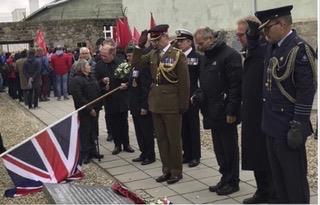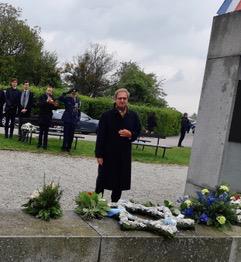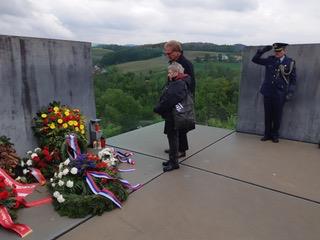MAUTHAUSEN REIS
Mauthausen 2019
 Deze keer vond de herdenking op zondag 5 mei plaats. Frank en ik waren donderdagavond aangekomen, zodat Frank vrijdag het een en ander kon regelen en ik de vergadering van de CIM kon bijwonen. Zondagochtend koersten we tamelijk vroeg naar het kampterrein om daar de Nederlandse ambassadeur Marco Hennis te treffen. Net als vorig jaar hebben we, samen met de Britse delegatie eerst bloemen gelegd bij het Englandspiel.
Deze keer vond de herdenking op zondag 5 mei plaats. Frank en ik waren donderdagavond aangekomen, zodat Frank vrijdag het een en ander kon regelen en ik de vergadering van de CIM kon bijwonen. Zondagochtend koersten we tamelijk vroeg naar het kampterrein om daar de Nederlandse ambassadeur Marco Hennis te treffen. Net als vorig jaar hebben we, samen met de Britse delegatie eerst bloemen gelegd bij het Englandspiel.

Bij het Englandspiel
Daarna togen we naar het Nederlandse monument, waar Herman Duizend jizkor en kaddish heeft gezegd. Dit keer waren er wat meer mensen, omdat behalve dat de gehele delegatie van de Nederlandse ambassade vertegenwoordigd werd, ook de zoon en schoondochter (Marc en Ria Brandon) van de voormalige voorzitter Mirjam Ohringer aanwezig waren.

De ambassadeur Marco Hennis
Daarna volgde het leggen van bloemen bij het monument van de Sinti en Roma. Heel bijzonder was, dat op het moment dat wij bloemen legden, bij het monument ernaast, (het Joodse monument) kaddish werd gezegd.

Bij het leggen van bloemen bij het monument van de Sinti en Roma
Hierna zijn er nog bloemen gelegd bij het internationale monument op de voormalige appelplaats en daarna zijn we naar de Steengroeve gereden waar we de laatste bloemen brachten. Het was een waardige herdenking. Na afloop van de ceremonie mochten we met de gehele delegatie van de Nederlandse ambassade lunchen in een restaurant in Mauthausen. Het was een buitengewoon samenzijn, waar we elkaar beter leerden kennen en ook afspraken konden maken. Met dank aan Brian Huijts, (eerste ambassadesecretaris van de Nederlandse ambassade in Oostenrijk). Waardoor Frank en ik de volgende ochtend nog voordat we naar Nederland vlogen, aangingen bij de Nederlandse ambassade in Wenen om daar het een en ander te bespreken over het monument.
Marjon de Klijn
Dit jaar stond de herdenking in het teken van NOOIT EEN NUMMER, ALTIJD MENS.
De voorzitter van het CIM (Comité Internationale de Mauthausen) Guy Dockendorf heeft een rede gehouden, welke hieronder wordt weergegeven.
MAUTHAUSEN May 5, 2019 Dear survivors, Dear guests of honour, Dear friends, Dear musicians and singer Dear moderators,
(1) In the Milano Appeal ofJuly1st 018, the international committees of former Nazicamps stated this:
“We are committed to preserving the former concentration camps which have become memorials of Humanity from oblivion, banalisation and destruction; we take inspiration for that work from the Resolution of the European Parliament of February, 11, 1993 [quote] “on the European and international protection as historic monuments of the places of the former Nazi concentration camps.» We are outraged by the recent attacks against the memorials in Mauthausen and Flossenbürg.”
This appeal was signed by the ANED, the Associazione Nazionale Ex Deportati Nei Campi nazisti and the International Committees of Auschwitz, Buchenwald-Dora, Dachau, Flossenbürg, Mauthausen, Natzweiler-Struthof, Neuengamme, Ravensbrück and Sachsenhausen.
We are extremely happy to have them today with us to commemorate the 74th anniversary of the Liberation of the Mauthausen concentration camp, together with the International Federation of Resistants Fighters and the Network of the Deutsche Lagergemeinschaften.
(2) This morning many of you ascended symbolically the 186 stairs of the Todesstiege, the stairway of death of Wiener Graben. It is important to know that this quarry had been the main reason for the camp’s localisation here in Mauthausen. The decision to build a concentration camp was taken as early as March 1938; the first detainees arrived already in August 1938.
It was the main labour Kommando of Mauthausen until 1942. Thousands of men climbed these steps day after day, zu fünf [five at a time], with a granite block on their shoulders. The “Stairway of Death”, had as its primary function to exhaust the detainees. Massacres on these steps happened daily, as men were pushed into the abyss, or forced to throw themselves down.
(3) In the memory of Mauthausen: Since the end of the 1940s, thousands of people from all over Europe have descended and ascended these stairs, many years in the company of survivors. Scaling these 186 steps is the core act of commemoration in Mauthausen. It harbours a symbolic force, which has not dwindled with time.
In the survivors’ stories, the quarry occupies a central place. This place has such an evocative power that it has become the emblem of Mauthausen among the Nazi camps, in the public understanding of the camps. The Wiener Graben and the Todesstiege have a heritage value which goes far beyond Austria.
(4) Today it matters greatly to preserve not only their general context, but also their use. One must avoid any actions which would banalise them, under the pretext of trying to avoid accidents or falls, none of which have been reported in the 74 years of commemorative use of this place.
The quarry and the stairway must be sanctuarized. The only thing asked of every visitor to the Mauthausen Memorial is that they know where they are there and what they are there for, as has been done since 1945.
Ladies and gentlemen, Dear Friends,
(5) Commemoration ceremonies like this one here in Mauthausen only make sense under the condition that we, the 2nd, the 3rd and soon the 4th generation take our guidance from the men and women who have been suffering here, that we take guidance from their convictions and their values which we have to transpose into the lives and societies of today. The international solidarity which has been the key issue of the Mauthausen Oath of May 16, 1945 must continue to be our guiding framework. This oath is for us, the 2nd, 3rd and 4th generations, our commitment.
(6) We are aghast to learn that more than 70 years after the proclamation of the Universal Declaration of Human Rights, the principles of human dignity and equality are being questioned today! We are horrified when we hear the Minister of the Interior of Austria proclaim three months ago: « Das Recht hat der Politik zu folgen und nicht die Politik dem Recht.» meaning that politics are above the Law.
We have to raise our voices, again and again, and speak up: YES, the message of the former Mauthausen prisoners is still valid. The message is clear: we have to fight against our own forgetfulness (Vergesslichkeit ) and ask ourselves: is Europe forgetting its own past? Some time ago CIM publicly declared this:
This Europe, which is barring the way to thousands of people, seems to have forgotten its own past. Its current richness stems also from the exploitation of mineral and human resources from other continents. Visibly, Europe has set aside the lessons from the terrible times of the twentieth century. Many Europeans, in both Eastern and Western Europe, have been refugees themselves during that century.
Europe appears to be turning a blind eye to the dangers posed by the mounting appeal of the extreme right and by neo-nazi groups. Instead of building bridges, Europe is erecting walls! The principles of humanism and international law request that Europe and the world community help refugees, instead of losing themselves in petty disputes.
We feel sorrow, helplessness and horror and remember a time when Jews, “Gypsies” and political refugees and so called “asocial people” were pushed around the borders of the so-called democratic states, in a sea of indifference and neglect.
(7) We strongly oppose slogans littered with xenophobia, racism, antisemitism and intolerance used by the extreme-right. We are extremely worried by the hate speeches of politicians who question international treaties and call for crusades, thus forcing many people to flee and accept degrading living conditions. We condemn all political decisions which continue to reduce the social rights of the weakest members of our societies.
(8) Thank God, there are rays of hope: In January 2018, the International Mauthausen Committee and the Mauthausen Komitee Österreich had written an open letter to the Federal President and to the Federal Chancellor.
The answer we got from the Federal President, Alexander Van der Bellen moved us deeply. We do hope that the whole Republic of Austria is still backing his statement dated January 11, 2018: [quote]
In my previous discussions with the actual Government, but also in my public addresses I have always emphasized that out of respect for our common history we have to assume responsibility for our national history, its luminous AND its darkest pages.
I have also pointed out that we must carefully choose the words we use. Words and wording are not innocent. They educate our conscience and later, will become real life.
We need to respect the rights of minorities; we need to respect dissidents and we have to help those people who need our help most of all.
This will be the ultimate test as to what is the true worth of our values.
[End of quote]
Thank you for listening!
Guy Dockendorf Chairman of Comité International de Mauthausen



Sorry, the comment form is closed at this time.